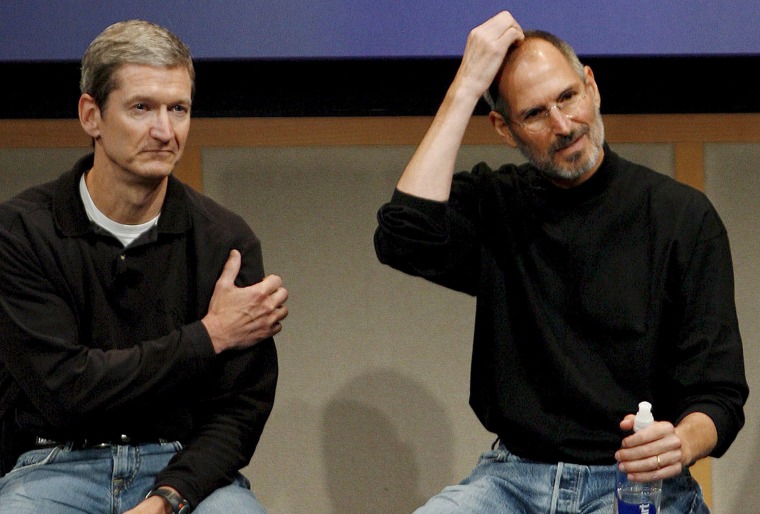The departure of Steve Jobs as Apple's CEO raises the question of whether the company will see changes in its famously insular corporate culture, one that places a premium on secrecy, opaqueness and a go-it-alone approach.
So far, new CEO Tim Cook is promising to leave the culture unchanged, but that may be a tall order at a company whose identity is so closely tied up with that of its co-founder and longtime CEO.
Jobs is the prodigy who helped build the first iconic personal computer, was cast out and then returned to build Apple into one of the world’s most valuable companies with his insistence on sleek design and attention to even the most minute details of user experience. And he did it all under a cloak of secrecy that only enhanced the products’ appeal.
Cook is an understated and hard-working leader, the yin to Jobs’ hot-burning charismatic yang. Cook, formerly Apple’s chief operating officer, has been with the company for 13 years, keeping the supply chain in order and production lines running smoothly. Despite the significant differences between Jobs and Cook, turning the reins over to Cook may prove to be far smarter, in a cultural sense, than finding a substitute Jobs.
“If you try to be Steve Jobs, the next person will never be Steve Jobs. It’s an opportunity for failure,” said Mike Mannor, assistant professor of management at the University of Notre Dame’s Mendoza College of Business.
Cook faces a tough challenge. Jobs has been given an extraordinary amount of credit for Apple’s return from the brink of bankruptcy in the 1990s. That could prove damaging to the Apple culture now that he’s in a less prominent role as chairman, said Jennifer Chatman, a professor at the UC Berkeley Haas School of Business.
“If people believe it’s the Steve Jobs show, they don’t feel as accountable,” Chatman said.
In business, the departure of a charismatic CEO be a disaster or a non-event.
It took Disney four chief executives after Walt Disney to regain its identity and its market position. For Southwest Airlines, the transition was much smoother. The difference, Chatman says, is that Southwest founder Herb Kelleher “was extremely committed to sharing the success of the company. The real question we have, because a big part of Apple’s culture has to do with secrecy and opaqueness, is to what extent do employees in the organization feel that they have been responsible for the success of Apple?”
If Cook were taking over in a normal succession, he would be thinking about how to solidify his vision and define the next era for the company. But this handover was prompted by Jobs’ health problems, and Chatman said it’s clear Jobs feels he still has work to do at the company.
“That kind of shadow leadership is very confusing for people within the organization. If Tim Cook is viewed as the future of this company, we need to know where he stands, in a kind of independent way,” she said.
Industry experts say Apple has several years’ worth of products already in the pipeline, but eventually, the Cupertino, Calif.-based company will have to come up with the next gadget for fans to covet. Andrew Hargadon, director of the UC Davis Graduate School of Management's Center for Entrepreneurship and a former Apple product designer, said he doesn’t fear a lack of good ideas.
“The community is great when coming up with opportunities,” Hargadon said. “The role of the authority is to say which idea we’re going to pursue and which others we will not. ... I think that was Jobs’ brilliance, keeping them from doing all the possible things out there to do.”
In the worst case, Apple could see a repeat of history. John Sculley, who remained CEO after Jobs was pushed out in the 1980s, “was so desperate to show he was every bit as creative as Steve was that we ended up with more products, 45 or 50 different products,” Hargadon said. When Jobs returned, he cut the product line down to seven or eight.
In a way, Apple has been rehearsing this moment for years, starting when Jobs took a medical leave of absence in 2004 to recover from treatment for a rare form of pancreatic cancer. He has since taken two more health breaks, in 2009 and this year.
“Apple has had to contend with what exactly it would be without Steve Jobs there every day. After the third time, they’ve become pretty good at that,” said Mannor. “From a day-to-day perspective, the culture has already adapted to what it’s like without Steve Jobs.”
